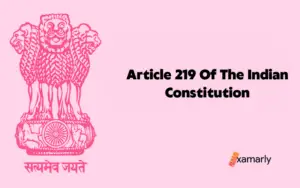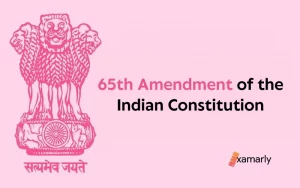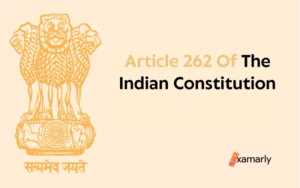The syllabus serves as the “constitution” of exams, compiling all the pertinent details about the topics in one location. You can effectively prepare for the competitive exam by using the curriculum. It assists students in planning, organizing, and carrying out the preparation approaches.
Thus understanding the management optional syllabus for UPSC Exam is an integral part of your preparation for the UPSC Mains Optional Paper of Management.
Read this article to comprehend the knowledge of the syllabus, pattern, which books to cover, and more such queries which you might ponder while preparing for the UPSC Exam.
- Management Optional Syllabus For UPSC
- Exam Pattern
- How to Prepare for UPSC Management Syllabus
- Important Books
- Conclusion
- FAQs
- Can I Finish The UPSC Management Syllabus In 6 months?
- Does The Management Optional UPSC Syllabus Make CSAT Easier?
- Who Can Opt For Management Optional Paper For UPSC Exam?
- What Is The UPSC Optional Management Syllabus?
- Is It Possible To Prepare The UPSC Management Syllabus In parallel To The UPSC Prelims Syllabus?
Management Optional Syllabus For UPSC
The principles of operations management are covered in the UPSC Management Syllabus, which is beneficial for all aspiring managers. Additionally, the applicants chose management as their optional subject because of the ease with which materials can be accessed to cover the UPSC management optional syllabus.
Knowing the Management Optional syllabus for UPSC will help you pick your preparation materials properly.
Management Optional UPSC Syllabus For Paper I
1. Managerial Function and Process :
Concept and Foundations of Management, Evolution of Management Thoughts; Managerial Functions – Planning, Organizing, Controlling; Decision making; Role of Manager, Managerial skills; Entrepreneurship; Management of innovation; Managing in a global environment, Flexible Systems Management; Social responsibility and managerial ethics; Process and customer orientation; Managerial processes on the direct and indirect value chain.
2. Organizational Behaviour and Design :
Conceptual model of organization behaviour; The individual processes – personality, values and attitude, perception, motivation, learning and reinforcement, work stress and stress management; The dynamics of organizational behaviour – power and politics, conflict and negotiation, leadership process and styles, communication; The Organizational Processes – decision making, job design; Classical, Neoclassical and Contingency approaches to organizational design; Organizational theory and design – organizational culture, managing cultural diversity, learning organization; organizational change and development; Knowledge-Based Enterprise – systems and processes; Networked and virtual organizations.
3. Human Resource Management:
HR challenges; HRM functions; The future challenges of HRM; Strategic Management of human resources; Human resource planning; Job analysis; Job evaluation; Recruitment and selection; Training and development; Promotion and transfer; Performance management; Compensation management and benefits; Employee morale and productivity; Management of organizational climate and Industrial relations; Human resources accounting and audit; Human resource information system; International human resource management
4. Accounting for Managers:
Financial accounting – concept, importance and scope, generally accepted accounting principles, preparation of financial statements with special reference to the analysis of a balance sheet and measurement of business income, inventory valuation and depreciation, financial statement analysis, fund flow analysis, the statement of cash flows; Management accounting – concept, need, importance and scope; Cost accounting – records and processes, cost ledger and control accounts, reconciliation and integration between financial and cost accounts; Overhead cost and control, Job and process costing, Budget and budgetary control, Performance budgeting, Zero-base budgeting, relevant costing and costing for decision-making, standard costing and variance analysis, marginal costing and absorption costing.
5. Financial Management:
Goals of finance function; Concepts of value and return; Valuation of bonds and shares; Management of working capital: Estimation and financing; Management of cash, receivables, inventory and current liabilities; Cost of capital; Capital budgeting; Financial and operating leverage; Design of capital structure: theories and practices; Shareholder value creation: dividend policy, corporate financial policy and strategy, management of corporate distress and restructuring strategy; Capital and money markets: institutions and instruments; Leasing, hire purchase and venture capital; Regulation of capital market; Risk and return: portfolio theory; CAPM; APT; Financial derivatives: option, futures, swap; Recent reforms in the financial sector.
6. Marketing Management:
Concept, evolution and scope; Marketing strategy formulation and components of the marketing plan; Segmenting and targeting the market; Positioning and differentiating the market offering; Analyzing competition; Analyzing consumer markets; Industrial buyer behaviour; Market research; Product strategy; Pricing strategies; Designing and managing Marketing channels; Integrated marketing communications; Building customer satisfaction, Value and retention; Services and non-profit marketing; Ethics in marketing; Consumer protection; Internet marketing; Retail management; Customer relationship management; Concept of holistic marketing.
Management Optional UPSC Syllabus For Paper II
1. Quantitative Techniques in Decision-Making:
Descriptive statistics – tabular, graphical and numerical methods, introduction to probability, discrete and continuous probability distributions, inferential statistics sampling distributions, central limit theorem, hypothesis testing for differences between means and proportions, inference about population variances, Chi-square and ANOVA, simple correlation and regression, time series and forecasting, decision theory, index numbers; Linear programming – problem formulation, simplex method and graphical solution, sensitivity analysis.
2. Production and Operations Management :
Fundamentals of operations management; Organizing for production; Aggregate production planning, capacity planning, plant design: process planning, plant size and scale of operations, Management of facilities; Line balancing; Equipment replacement and maintenance; Production control; Supply chain management – vendor evaluation and audit; Quality management; Statistical process control, Six Sigma; Flexibility and agility in manufacturing systems; World class manufacturing; Project management concepts, R&D management, Management of service operations; Role and importance of materials management, value analysis, make or buy decision; Inventory control, MRP; Waste management.
3. Management Information System :
Conceptual foundations of information systems; Information theory; Information resource management; Types of information systems; Systems development -Overview of systems and design; System development management life-cycle, Designing for online and distributed environments; Implementation and control of the project; Trends in information technology; Managing data resource -Organizing data; DSS and RDBMS; Enterprise Resource Planning (ERP), Expert system, e-Business architecture, e-Governance; Information systems planning, Flexibility in information systems; User involvement; Evaluation of information systems.
4. Government Business Interface :
State participation in business, Interaction between Government, Business and different Chambers of Commerce and Industry in India; Government’s policy with regard to Small Scale Industries; Government clearances for establishing a new enterprise; Public Distribution System; Government control over price and distribution; Consumer Protection Act (CPA) and The Role of voluntary organizations in protecting consumers’ rights; New Industrial Policy of the Government: liberalization, deregulation and privatization; Indian planning system; Government policy concerning development of Backward areas/regions; The Responsibilities of the business as well as the Government to protect the environment; Corporate Governance; Cyber Laws.
5. Strategic Cost Management :
Business policy as a field of study; Nature and scope of strategic management, Strategic intent, vision, objectives and policies; Process of strategic planning and implementation; Environmental analysis and internal analysis; SWOT analysis; Tools and techniques for strategic analysis – Impact matrix: The experience curve, BCG matrix, GEC mode, Industry analysis, Concept of the value chain; Strategic profile of a firm; Framework for analyzing competition; Competitive advantage of a firm; Generic competitive strategies; Growth strategies – expansion, integration and diversification; Concept of core competence, Strategic flexibility; Reinventing strategy; Strategy and structure; Chief Executive and Board; Turnaround management; Management of strategic change; Strategic alliances, Mergers and Acquisitions; Strategy and corporate evolution in the Indian context.
6. International Business :
International Business Environment: Changing composition of trade in goods and services; India’s Foreign Trade: Policy and trends; Financing of International trade; Regional Economic Cooperation; FTAs; Internationalization of service firms; International production; Operation Management in International companies; International Taxation; Global competitiveness and technological developments; Global e-Business; Designing global organizational structure and control; Multicultural management; Global business strategy; Global marketing strategies; Export Management; Export- Import procedures; Joint Ventures; Foreign Investment: Foreign direct investment and foreign portfolio investment; Cross-border Mergers and Acquisitions; Foreign Exchange Risk Exposure Management; World Financial Markets and International Banking; External Debt Management; Country Risk Analysis
Exam Pattern
Similar to another optional paper for UPSC CSE Exam, Management optional syllabus for UPSC Exam includes two Papers. Both these papers are subjective in nature which means thorough preparation is required to bring a good score.
Each of the two papers holds 250 marks, thereby making a management optional paper of 500 marks in the UPSC CSE Exam.
The ball will be in your court if you prepare for the Exam in the best possible way. This implies that you have to make a grip on the subjects you are preparing for. This will help you to shine among the crowd with ease.
To know more about the UPSC Exam Pattern, click on the linked article.
How to Prepare for UPSC Management Syllabus
Here are some Preparation strategies for Management optional for aspirants.
- You need to concentrate on organizational behaviour, HR, finance, and marketing in the Paper.
- Due to the fact that they account for around 80 percent of the questions in Paper I, OB and HR are quite significant.
- The UPSC has so far only included short topics in the accounting area, such as marginal costing vs. absorption costing, budgeting strategies, inventory management, and similar.
- They pose theoretical-based questions also in the financial part.
- You can choose between marketing and finance. However, as was already stated, HR and OB are essential.
- It is advised to stick with straightforward formulas and fundamental frameworks and models for the case studies in this paper.
- Study fundamental notions such as Porter’s Five, the McKinsey Framework, the BCG Matrix, etc. It is unnecessary to delve into complex models.
Tips To Score High Marks
- It is important to prepare for the exam thoroughly, as the syllabus of this subject is very long.
- UPSC offers previous year’s question papers to the candidates on its website. It is better to solve these papers. A minimum of 50 percent of the questions are repeated. This clearly points out that merely solving a paper seriously will take you one step closer to achieving a good score.
- It is also advisable to avoid jargon and heavy language while answering questions in the exam. It is better to write your answers in simple words and in points.
- Though the UPSC management optional paper is subjective, try to answer the questions in points and give a subheading along with it.
- If it is required, provide the table and draw the diagram in your answer to clearly present your views.
- Make an effort to convey your response in a clear and appealing manner because the questions are straightforward and everyone will give the same information in their answers.
To explore more about the UPSC Preparation Strategy, visit the linked article.
Important Books
Some of the important books are listed below which will help you to prepare for this optional paper easily.
- Human Resource Management by K Aswathappa
- Financial Management by Prasanna Chandra
- Marketing Management by Philip Kotler
- Cost and Management Accounting by MN Arora
- Fundamentals of Management by DeCenzo, Agarwal, Bhattacharya and Robbins
- Strategic Management by Hill and Jones
- Operations Management by Heizer and Render
- International Business by Hill and Jain
- Business Environment by AC Fernando
Related Links:
Conclusion
In the Management optional syllabus for UPSC, you will learn topics that are relevant to both your IAS officer job and your day-to-day office duties. Despite being an optional subject, management has gained popularity among IAS applicants in recent years.
In fact, management graduates are making up a significant percentage of the toppers’ list. You should know that management is a logical subject. You will have to provide precise and unique answers to the questions in the exams. This is all about Management Optional in UPSC exams. Best wishes for your Preparation.
FAQs
Can I Finish The UPSC Management Syllabus In 6 months?
The candidate must develop a sound plan if they hope to succeed on the UPSC Exam. Always go through your full syllabus and note the essential topics that need for more study and time. If you prepare diligently, you should be able to finish the UPSC Management Syllabus in 6 months.
Does The Management Optional UPSC Syllabus Make CSAT Easier?
Yes, the UPSC CSAT content is simpler to grasp because students who select the UPSC Management Option often have remarkable math and aptitude skills. Anyone can easily complete the syllabus if they put in extra effort and effort.
Who Can Opt For Management Optional Paper For UPSC Exam?
Candidates who have a management background can opt for this optional paper. Hence, they will find it easier to prepare for it. This optional paper covers various topics related to day-to-day office work. It is a logical and rational subject. Having a success rate of 12% to 15% shows why it is popular amongst IAS aspirants. There are many standard management books that will help you prepare for this paper.
What Is The UPSC Optional Management Syllabus?
UPSC management optional syllabus covers a variety of topics relevant to the IAS officer job. These topics include process and customer orientation, manager processes on the direct and indirect value chain, organizational theory and design, knowledge-based enterprise systems, and strategic management. The syllabus also covers recent changes in the financial industry and international human resource management.
If you’re not good at writing, you can choose an optional subject with diagrams, like physics or geography. A subject that you love will keep you interested and avoid boredom. While you can choose the best subject based on interest, don’t forget to look at past results to determine which subjects are easy to tackle.
Is It Possible To Prepare The UPSC Management Syllabus In parallel To The UPSC Prelims Syllabus?
Yes, it is perfectly acceptable to study for the UPSC optional management syllabus at the same time as the UPSC prelims curriculum, however, aspirants must have a sound methodology and time management plan.






